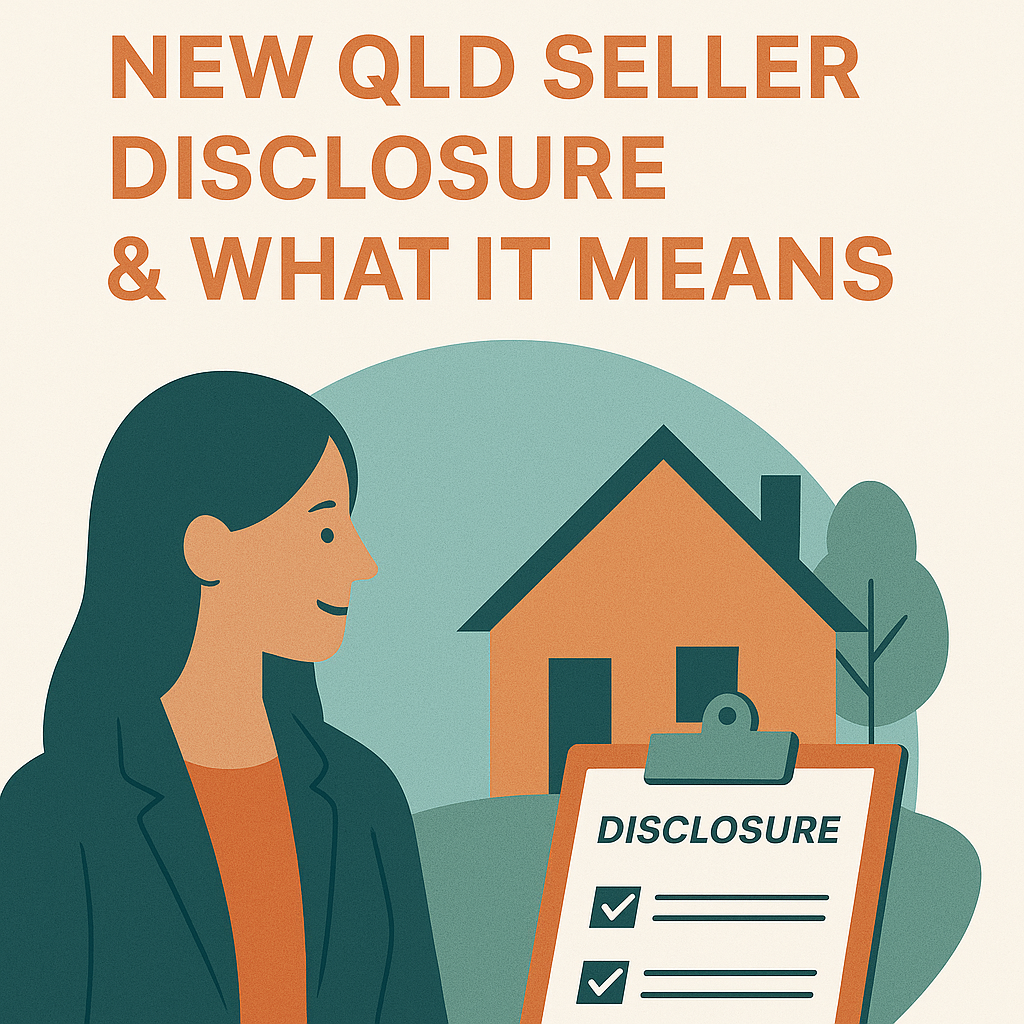Queensland’s New Seller Disclosure Laws: What Every Buyer and Investor Needs to Know
Imagine this: you’ve just signed a contract on a Queensland property. You’re excited, the champagne’s chilling in the fridge… and then a few weeks later you discover the house is sitting in a flood zone or there’s an unapproved extension out the back. Suddenly that dream deal feels more like a nightmare.
Up until now, that kind of scenario wasn’t unusual in Queensland. Buyers had to dig around, ask the right questions, and hope nothing major was lurking in the background. But from 1 August 2025, the rules change. And they change big.
Why Seller Disclosure Matters
Queensland has finally waved goodbye to its old “buyer beware” approach. The new Property Law Act 2023 introduces mandatory seller disclosure requirements.
In plain English: sellers must now provide buyers with a complete Form 2 Seller Disclosure Statement (plus all required certificates) before a contract is signed. If they don’t, the buyer can terminate — no questions asked.
Why does this matter for you as an investor or homebuyer? Because it gives you more transparency, more protection, and the chance to make smarter decisions about where your money goes. At Homez Buyers Advocacy we see this as a huge shift in how property transactions will play out across Queensland.
Breaking It Down: What Sellers Must Disclose
Here’s what the new law says must be on the table:
- Title details and encumbrances (covenants, easements, unregistered leases)
- Zoning and planning restrictions (future rezoning, heritage overlays)
- Government or environmental notices (contamination, resumptions, tree preservation orders)
- Rates, water charges, pool safety compliance
- Body corporate documents for units and townhouses
Miss one of these, and the buyer can walk. Not later, not halfway through finance — any time before settlement.
What Sellers Don’t Have to Disclose (The Buyer Trap)
Here’s where you need to stay sharp. Sellers don’t need to disclose:
- Flood history
- Pest or structural issues
- Asbestos, electrical, or plumbing concerns
- Renovations done without council approval
That means your own due diligence is still non-negotiable. This is where professional guidance matters. Our client success stories show how skipping inspections has cost some buyers tens of thousands — while thorough checks helped others secure properties with hidden upside.
Fresh Insight: What This Means for Investors
- Negotiation Leverage
A disclosure statement isn’t just paperwork — it’s intelligence. If zoning overlays or encumbrances pop up, most buyers will panic. But savvy investors see opportunity. For example, a lot near a planned transport corridor might look risky now, but could be prime for capital growth in five years. - Fewer Collapsed Deals
With everything upfront, fewer sales should fall apart late in the game. That means less wasted time and money chasing dead contracts. - Pressure on Sellers
Some vendors will struggle to pull the right documents together. That’s your chance to spot gaps — and either walk away safely or use it to negotiate harder. - Rising Market Transparency
Over time, this could mean a more efficient Queensland property market. Less “mystery box” investing, more clarity. But it also means fewer bargains for those relying purely on hidden information.
Real Example: Two Investors, Two Outcomes
- Investor A jumped into a townhouse deal without reviewing the disclosure carefully. Weeks later, they found out about a body corporate dispute over costly façade repairs. They walked away, but wasted thousands on legal and finance fees.
- Investor B reviewed the seller disclosure with their buyer’s agent. They noticed a zoning overlay that allowed future subdivision. They secured the deal at a discount, knowing most buyers would overlook the opportunity.
Same property market. Same new laws. Different outcomes.
Takeaways for Buyers and Investors
- Keep doing due diligence — seller disclosure is a safety net, not a full inspection.
- Read disclosures like an investor, not a lawyer — look for both risks and opportunities.
- Move faster — the extra upfront info means you can make confident decisions quicker than the competition.
- Lean on experts — your solicitor, building inspector, and buyer’s agent are your best line of defence.
- Expect more transparency, but fewer hidden bargains — sharp investors will adapt, not complain.
Wrap-Up
Queensland’s new seller disclosure laws are the biggest shake-up to property sales in decades. For investors, they’re both a shield and a weapon. You’re safer from nasty surprises — and you’re also better armed to spot opportunity.
At Homez Buyers Advocacy, we see these changes as a positive step for serious buyers. But success will still come down to strategy, timing, and knowing how to interpret the fine print.
Thinking about your next property move? At Homez Buyers Advocacy, we’ll help you cut through the noise and buy with confidence.
Get in touch today.
